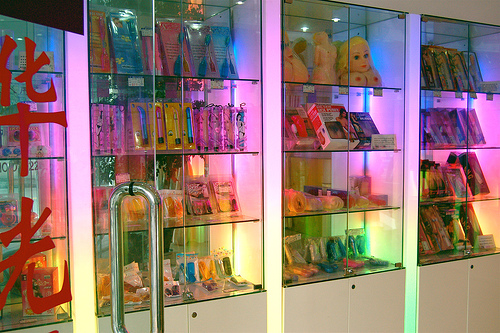Sifting the imagined facts from the meaningless ones in the lengthy China Daily story “A Kiss of Life For Sex Toys” is even more work than doing that same task with articles about sex in the mainstream western media.
The article in the state-run newspaper almost completely ignores China’s importance as a major producer of sex toys for the West — usually of the ultra-cheap, low-quality, high-profit (and often enough smells-like-urinal-cakes) variety. Something like 70% of the sex toys in the world are made in China, a nation with dicey safety standards both for workers and products. The article quotes from a solitary manufacturer, near the end, but lets him say pretty much nothing other than “the market is growing and sex toys are good.” It leaves his comments out of context — and never cops to how huge China is in the manufacturing trade worldwide, a fact that’s like an elephant in the room throughout the article.
The article instead focuses on Chinese middle-class consumers of sex toys, which is certainly an interesting development in Chinese sexual culture. The integration of Hong Kong clearly had a significant effect on the PRC as a whole, and post-unification Hong Kong has long had a reasonably robust market for in-home sex toy parties for women for quite a while.
While the People’s Republic of China proper remains very conservative, it does have a developing middle class. But its middle class is by all accounts not developing nearly as quickly as India, partially because of PRC development principles that favor manufacturers over workers to a terrifying degree. They’re the same principles that have allowed the PRC to become the manufacturer for the vast majority of cheap sex toys…which, incidentally, the article fails to mention. (No…really?)
Nonetheless, according to the China Daily story, there are a lot of sex toy sales in China and they’re very much on the rise — especially online. That’s no surprise, no matter how bad I think the sex toys smell. Unfortunately, the article’s “facts” are wonky and ill-delivered, and the business figures seem to be not very well understood by the author.
What grabs me, though, is that they seem to have the same “sex experts” we do in the States — unidentified, unreferenced phantom sort whose numbers aren’t sourced by the reporter, and don’t actually make a lot of sense. For the record, I don’t dispute that there’s (probably) a healthy increase in sex toy sales in China, but it’s certainly not “demonstrated” by whatever “data” it is China Daily thinks it’s quoting.
I’m sure I just opened the floodgates for all y’all to leave comments asking why I would believe anything a state-run Chinese newspaper says. To which I say, PUH-LEEZE. The question is not whether the article is reliable or factual…of course it’s not. Neither are articles in Western media…except when they are. The important questions are in what way does this article mislead the reader, and what is this article’s agenda? They’re the same questions I always ask, admittedly in a somewhat paranoid fashion, whenever I see articles in mainstream Western media sources. And, sadly, China Daily clearly learned its sex-reporting techniques from U.S. newspapers.
As far as I can tell, this article’s principal agenda is to provide support for the idea that the Chinese middle class is an emerging market for sex toys. To that end, check out this “fact” packed string of paragraphs:
There are no official statistics on the number of sex product stores in China, but sex experts estimate that 200,000 stores compete for annual sales of at least 100 billion yuan ($14.7 billion).
Over the past five years, thousands of online sex shops have opened as well, said Lin Degang, a council member of China Sexology Association, an academic society focused on sexual health.
Statistics from e-commerce giant Taobao show that sex toy retailers took in more than 14 million yuan (about $2.1 million) in June. How many sellers are there? A China Daily reporter searched Taobao for “sex toy” on Thursday and got about 26,000 hits.
…With the exception of condoms, sex products cannot be advertised in China on TV or radio or in print media. There is no restriction on websites, however, so that’s where Chu Chengxin runs his business.
He is 36, has been selling sex goods for 11 years, and says the profit margin is huge. A pack of condoms made in China costs 1.8 to 2.5 yuan wholesale, he said, but it retails for 10 to 25 yuan.
From 2000 to 2009, Chu ran a bricks-and-mortar store that cost him about 10,000 yuan. He said he earned about 80,000 yuan each year.
The next “booming trend in China” will be selling sex toys online, said Yang Changjing, the 27-year-old boss of Zui-qingfeng, a sex toy shop on Taobao.com.
Search Taobao for “sex toys”, and you’ll see a gold crown next to his shop’s name, indicating 500,000 or more sales since the store opened in 2008. Other symbols indicate lesser milestones; silver crowns, for example, signify 10,000 sales.
“The biggest sex toy shop on Taobao had only gained three silver crowns in early 2010, which showed that its total sales volume was just over 100,000 deals,” Yang said. “But now, there are two golden crown stores. It’s a big increase.”
[Link.]
Clearly the translation causes its own problems, but that doesn’t even begin to explain the jumps in logic from sentence to sentence and paragraph to paragraph, which get worse the further you read. In an attempt to look like it’s supporting its central assertion — that sex toy sales are on the rise, and that there’s money to be made in selling them to Chinese consumers — the article jumps all over the place. It goes from “except for condoms” to “the profit margin on condoms,” from “cost” to “earned” to “500,000 sales,” and don’t even begin to try to sort out the strong implication that three silver crowns, each said to represent 10,000 sales, mysteriously equals 100,000 sales one paragraph later. And “A China Daily reporter searched Taobao for “sex toy” on Thursday and got about 26,000 hits.” What the hell is that supposed to prove?
Then there’s the weird juxtaposition of products here:
[A woman] she typed chengren (adults) into a search engine and was surprised by some of the results – sex products, including vibrators and sexy-looking underwear for women and inflatable dolls for men…When she found something she liked and clicked on “buy”, she joined thousands of people who purchase erotica online. At the outset, her boyfriend asked her not to buy such “vulgar” products. Then he saw how she looked in the new underwear. In the past two years, they have bought two more pieces of sexy undies and two vibrators.
[Link.]
Well, “vibrators,” “sexy-looking underwear for women” and “inflatable dolls for men” might be reasonably juxtaposed in Chinese culture, I don’t know. Over here in the States, they’re not the same thing, but that’s close enough to a potential cultural difference that I’m not entirely willing to comment on anything other than its apparent bizarreness…or the fact that when I type “adults” into a search engine, I get “Adult Swim” and some Sri Lankan film, not sex toys. I can only presume that Chinese discretion is playing a role here, in not wanting to say what she actually searched, or that “chengren” has a connotation not communicated by the English word “adults.”
I can, however, comment on the mixing-up of “numbers from nowhere” with anecdotal data that doesn’t match. An article that wants to throw around facts and figure then can’t use vague terms like “thousands” to shore up numbers that have no context and nothing to do with one another. If the point is to prove that sex toy purchases are on the rise, confused facts and figures don’t do that any more than vague terms like “thousands.” What they do is mislead the reader into believing that because there are facts and figures quoted, the assertions of the article must be based on fact.
But facts do not equal logic, and presenting them as thus is duplicitous. In fact, they make the article’s agenda seem more suspicious. And as I said above…what’s the agenda?
I believe China Daily has produced a puff piece designed to help create buzz for opening up more domestic markets for Chinese manufacturers to market sex toys to Chinese consumers online. In so doing, the state-owned, state-run paper is likely ingratiating itself with “connected” businesspeople.
That’s evidenced by the fact that the only manufacturer the article quotes is Zhang Chi, sales manager of “lover,” which the article says is “China’s first major government-licensed manufacturer of erotica.” (The article repeatedly uses the term “erotica” to mean erotic products; we occasionally see it used that way in the States, but the term is really not known that way).
China’s first major government-licensed manufacturer of erotica calls the industry “delicate”.
The door to the market in China has opened only a fraction, said Zhang Chi, sales manager of Lover, and total sales on the Chinese mainland are no more than those in Japan, which has less than 10 percent of China’s population.
He said that from 1994 to early 2000, the factory’s gross profit margin was just 20 percent. Lover’s products exceeded demand. But in 2000, the company received a $200,000 investment from a Japanese company and gained its technical support. The new products coming off the line and the foreign market turned things around, and in 2006, Lover’s sales reached $8 million.
Now the company claims 70 percent of the sex toy production on the Chinese mainland. More than 90 percent of its products are exported, for sale in 27 countries.
“Sex toys are taken as evil things by many people,” Zhang said. “We are doing something meaningful, which brings new ideas to people’s sex and helps them have better sex.
“The potential of the market has not been stimulated yet.”
[Link.]
The article does also quote a devil’s advocate, Xia Xueluan, Peking University sociology professor, who delivers a telling doozy:
[Xueluan] said the public, especially the younger generation, should develop a good sex life with their boyfriends or girlfriends, or their spouses.
“Indulgence in sex toys will be harmful to people, physically and psychologically, as they should have a natural sex life,” Xia said.
[Link.]
Er…I don’t think there’s any need to debunk that part of it, but it’s a bizarre example of the article’s persistent sex-negative language (which I haven’t even really begun to address here, incidentally) coming home to roost. The result is an article that tries to push a business-friendly agenda but can’t resist shaming consumers of the product it’s describing…just like a lot of sex-related articles in the States.
But then, what do I expect? It’s the state-run China Daily, not the cleverer-than-Shanghaiist Global Times, right?
Image: Sex toy shop in Shanghai, by Dominique Bergeron (Creative Commons).





